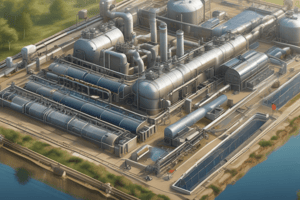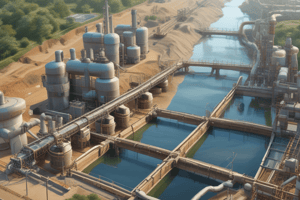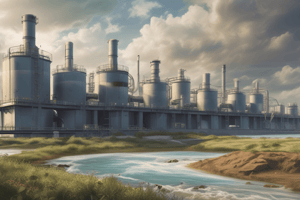Podcast
Questions and Answers
What is a key focus of the course on water and wastewater treatment?
What is a key focus of the course on water and wastewater treatment?
- Understanding the political implications of water usage
- Designing urban landscapes to optimize water flow
- Managing financial resources for water treatment
- Modern trends of water resource management and treatment systems (correct)
Which property of water is essential for determining its suitability for various uses?
Which property of water is essential for determining its suitability for various uses?
- Density
- Viscosity
- Color
- Electrical conductivity (correct)
Which method is typically used in the treatment of municipal drinking water?
Which method is typically used in the treatment of municipal drinking water?
- Chlorination
- Coagulation
- Filtration
- All of the above (correct)
What is a significant negative effect of wastewater on the environment?
What is a significant negative effect of wastewater on the environment?
In the context of water bodies, what differentiates contaminants from pollutants?
In the context of water bodies, what differentiates contaminants from pollutants?
What is one of the main parameters students will learn to classify different water bodies?
What is one of the main parameters students will learn to classify different water bodies?
What is included in the hydrological cycle that students will discuss during the course?
What is included in the hydrological cycle that students will discuss during the course?
Which of the following categories of organisms will students learn to classify?
Which of the following categories of organisms will students learn to classify?
What type of bond forms between the hydrogen and oxygen atoms in a water molecule?
What type of bond forms between the hydrogen and oxygen atoms in a water molecule?
Which type of bond is described as weak attractions between water molecules?
Which type of bond is described as weak attractions between water molecules?
What characteristic of water is responsible for its ability to dissolve ions and polar molecules?
What characteristic of water is responsible for its ability to dissolve ions and polar molecules?
What is the value of water's specific heat capacity?
What is the value of water's specific heat capacity?
Which property of water is primarily responsible for causing capillary action?
Which property of water is primarily responsible for causing capillary action?
What term describes the heat required to raise the temperature of a substance by one degree Celsius?
What term describes the heat required to raise the temperature of a substance by one degree Celsius?
How does the density of water compare to most other liquids?
How does the density of water compare to most other liquids?
Which statement about electronegativity in water molecules is true?
Which statement about electronegativity in water molecules is true?
What is the latent heat of vaporization in the context of water?
What is the latent heat of vaporization in the context of water?
What is the impact of water's universal solvent property?
What is the impact of water's universal solvent property?
Flashcards are hidden until you start studying
Study Notes
Course Overview
- Course titled "Water and Wastewater Treatment" offered by the University of Mines & Technology, Ghana.
- Focuses on modern trends in water resource management and treatment systems.
Course Structure
- Covers fundamental topics including:
- Structure, properties, and uses of water
- Hydrological cycle and water resources
- Water quality characteristics
- Water pollution and treatment
- Wastewater and its treatment
Learning Outcomes
- Define basic terms in water and wastewater treatment.
- Differentiate various uses of water: industrial, agricultural, municipal.
- Describe essential properties of water: universal solvent, polar nature.
- Discuss the hydrological cycle and its role in environmental sustainability.
- Identify water quality differences among surface water, groundwater, and rainwater.
- Classify water bodies based on their characteristics and uses.
- Calculate water inflow and outflow using relevant parameters.
- Categorize aquatic organisms based on their habitats and roles.
- Explain key water quality characteristics and identify negative impacts of poor water quality.
- Trace sources, types, transport, and entry points of pollutants in water bodies.
- Distinguish between contaminants and pollutants.
- Summarize municipal drinking water treatment processes.
- Discuss wastewater treatment technologies and their environmental impacts.
Student Assessment
- Continuous Assessment (CA): 40%
- Quizzes, Assignments, Group Presentations (30%)
- Class Attendance (10%)
- End of Semester Examination: 60%
Structure of Water
- Water molecule consists of two hydrogen atoms and one oxygen atom (H2O).
- Atoms are held together by covalent bonds formed from shared electrons.
- Oxygen is more electronegative than hydrogen, leading to partial charges: oxygen is partially negative, hydrogen partially positive.
- Water is a polar molecule, which contributes to its unique properties.
Properties of Water
- Dissolving Ability: Water is a universal solvent, effective at dissolving ions and polar molecules but not nonpolar substances; makes it vulnerable to pollution.
- Thermal Properties:
- Specific heat: 1.0 calorie/g.°C (4.1868 J/g.°C), allows water to heat/cool slowly, stabilizing temperatures in coastal areas.
- Latent heat: Heat absorbed/released during phase changes without temperature change, crucial for processes like melting and vaporization.
- Cohesion and Adhesion:
- Cohesion: Water molecules stick to each other, resulting in high surface tension due to hydrogen bonds.
- Adhesion: Water can stick to other substances, leading to capillary action, which allows it to rise against gravity in narrow spaces.
Environmental Impact
- Water’s ability to dissolve various substances makes it susceptible to pollutants, necessitating effective water treatment solutions and regulations to protect water quality and ecosystems.
Studying That Suits You
Use AI to generate personalized quizzes and flashcards to suit your learning preferences.





